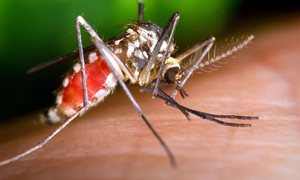
Flying less is possible, as the COVID crisis has taught us over the past two years. This also applies to scientists who regularly fly around the globe for their work. A group of international scientists, led by Teun Bousema of Radboud university medical center, published on the carbon footprint of academic travel in the The Lancet Planetary Health. They also started a petition calling on colleagues, funders, institutes and conference organizers to adopt a thoughtful travel policy. The tally now stands at over a thousand signatories.
In addition to the COVID-19 crisis, there is the crisis of climate change. The temperature on earth is rising, which has enormous consequences for the environment, nature and people. This rise in temperature, caused by an increase in greenhouse gases, is fuelled by our flying habits. Academics have, because of their many flight movements, a carbon footprint that is larger than that of entire countries such as Iceland and Uganda. The COVID pandemic has led to a sharp decline in air travel and shown that frequent flying is not always necessary. Whereas for a long time it was customary to meet physically for all international conferences, it turned out that virtual conferences form a useful alternative that can complement or replace in-person meetings.
That is why this is the moment to make a lasting change, according to a group of international researchers, initiated by Teun Bousema, Professor of Epidemiology of Tropical Infectious Diseases at Radboud university medical center and Dr. Kate Whitfield of ISGlobal in Barcelona. They argue for more thoughtful travel. Many academic trips are paid for by public funds. Bousema explains that funders of scientific research have a powerful role to play in encouraging or enforcing sustainable research and travel behavior among academics. "Funders can include a sustainability paragraph in research proposals. In addition, tens of millions of air miles are travelled each year by research funders who fly in experts to review proposals. Regularly, also candidates fly thousands of miles for a thirty minute interview; that's really very hard to justify during a climate crisis," says Bousema.
The Thoughtful Travel Pledge
The researchers have launched the Thoughtful Travel Pledge, an initiative that consists of a petition that can be signed by anyone in the research community. Signers of the petition call for a reduction in the carbon footprint at all levels, from scientists to universities, conference organizers and funders of academic research. The petition has now been signed by over a thousand academics.
Professor Mosquito investigates extreme travel behavior
In addition, the team developed an animation about fearless Victorian scholar and ethnologist Prof. Dr. Geoffrey Mosquito, who extends his lifelong fascination with the peoples of science to examine their lavish meeting habits and extreme travel behavior.
The goal is gain more attention for thoughtful travel. Bousema tries to set a good example himself: "I have been trying to make more conscious choices about travel for work for some time now, for example by regularly skipping an international conference and simply refusing to jump on a plane to a short meeting."
More information
- Find out more about the Thoughtful Travel Campaign here.
- Watch the animation here.
- Sign the petition here.
About the publication in The Lancet Planetary Health
The critical role of funders in shrinking the carbon footprint of research - Teun Bousema, Leonard Burtscher, Olivier Berné, Ronald van Rij, Didier Barret, Kate Whitfield.
-
Want to know more about these subjects? Click on the buttons below for more news.
More information
Pauline Dekhuijzen

wetenschaps- en persvoorlichter
Related news items

Grants for research on magnesium deficiency and malaria Vidis for Felix Hol and Jeroen de Baaij
1 July 2022 Radboudumc researchers Jeroen de Baaij and Felix Hol both receive an NWO Vidi grant for their research, respectively on magnesium deficiency in type 2 diabetes and on malaria. go to page.aspx?width=800&height=533&ext=.jpg&type=BlockColumn1Zoom1)
New test for Lyme disease is not reliable
15 June 2022 To determine whether someone has Lyme disease, doctors in the Netherlands often use antibody tests. For some time now, so-called cellular tests have been available on the market. However, the VICTORY study published in The Lancet Infectious Diseases has found that these tests are not reliable. go to page
Field research on malaria vaccine offers unexpected surprise
23 May 2022Field research on the effectiveness of a malaria vaccine, came up with unexpected results for an international group of researchers including Benjamin Mordmüller of Radboudumc. The vaccine evokes a broader response against malaria proteins than there are in the vaccine.
go to page
The future of laboratory animal research More attention to living conditions of laboratory animals
16 May 2022 On May 9, a meeting took place at the Radboudumc as a result of the launch of the Dutch Transparency Agreement on Animal Testing. The Radboudumc is one of the twenty signatories and has thus committed itself to openly and transparently communicate its vision and policy with regard to animal testing. go to page

